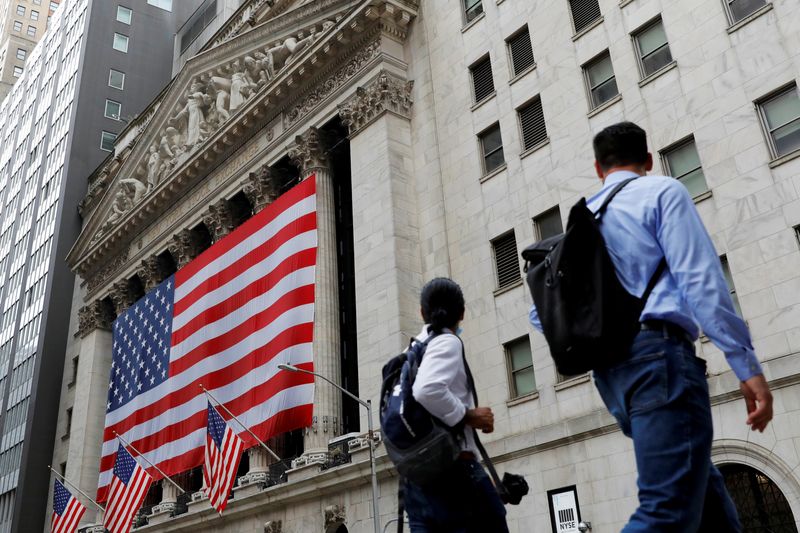By David Randall
NEW YORK (Reuters) - As U.S. inflation worries grow, some investors are preparing for the 10-year U.S. Treasury yield to breach a 16-year high of 5% hit last October.
Bond yields, which move inversely to prices, have climbed in recent weeks as signs of persistent inflation erode expectations for how deeply the Federal Reserve will be able to cut interest rates without further fueling consumer prices. The yield on the benchmark 10-year note is up 80 basis points this year and last stood at 4.70%, a five-month high.
Many investors are betting further weakness lies ahead for bonds. Global fund managers' fixed income allocations in the latest BofA Global Research survey are down to their lowest level since 2003. Bearish Treasury positioning among some classes of hedge funds stands at its highest level of the year, according to BofA data, even as other asset managers have increased their bullish bets.
"It all boils down to one word: inflation. If the market doesn't see signs that inflation is contained, then there's no reason that yields won't keep pushing higher," said Don Ellenberger, senior portfolio manager at Federated Hermes. He has decreased his portfolio's interest rate sensitivity, wary that sticky inflation and labor market strength could push yields as high as 5.25%.
Further evidence that inflation is heating up again came on Thursday, with data showing the personal consumption expenditures (PCE) price index excluding food and energy rose far more than expected in the first quarter. Futures markets showed investors now expect the Fed to deliver just 35 basis points in rate cuts this year, compared to the more than 150 points that were priced in at the beginning of 2024.
Another hot inflation reading on Friday, when PCE data for March will be released, could further close the window on rate-cut expectations this year. More insights on the economy could come at the conclusion of the U.S. central bank's monetary policy meeting on May 1.
'HIGH-WATER MARK'
The level of Treasury yields is closely watched by market participants, as elevated yields can translate into higher borrowing costs for consumers and companies and tighten financial conditions in the economy.
A sharp run-up in yields during the latter part of 2023 sparked a sell-off in the S&P 500, though equities rebounded when yields reversed. This year's rally in stocks has stumbled in recent weeks as yields have risen, with the S&P 500 cutting its gains to around 6% on a year-to-date basis, from more than 10%.
Some investors have used the weakness in bonds to add to their fixed income holdings, confident that yields are unlikely to rise much further unless the Fed says it is looking to once again raise its benchmark overnight interest rate from the current 5.25%-5.50% range. Others, however, have been skeptical inflation will cool anytime soon.
"Inflation is not coming down like the Fed thought it was," said Arthur Laffer, president of Laffer Tengler Investments, who is bearish on longer-dated Treasuries and believes yields could rise as high as 6%. "You're not getting paid to take risk in the bond market right now."
Michael Purves, head of Tallbacken Capital Advisors, wrote it's "not inconceivable" that the 10-year Treasury yield could reach its 2007 high of 5.22%, if higher prices for oil and other raw materials continue pushing up inflation.
The price of Brent crude is up about 17% on a year-to-date basis, even after retreating in the last week on easing fears of a wider conflict in the Middle East.
Fiscal worries are another factor that could push yields higher. Ratings agency Fitch downgraded the U.S. credit rating last year partly due to concern over rising debt levels. Many investors anticipate a rise in term premiums - or the compensation demanded to hold long-term debt.
"The fiscal conditions of the U.S. are starting to matter, and it can put tremendous pressure on yields and push down on equity valuations in a very short period of time if the market starts to worry more," said Bryant VanCronkhite, a senior portfolio manager at Allspring Global Investments, who expects 10-year Treasury yields to move above 5%.
Still, there are reasons to think a return to 5% yields would be a "high-water mark" for investors, said Alex Christensen, a portfolio manager at Columbia Threadneedle Investments who is overweight two-year Treasuries.
The market narrative that dominated since the so-called Fed pivot in December "was very one-sided and left little room for changes in the inflationary trend," Christensen said.

He believes the Fed is unlikely to pivot towards rate increases.
"We think the general inflationary trend is stable to lower," he said.